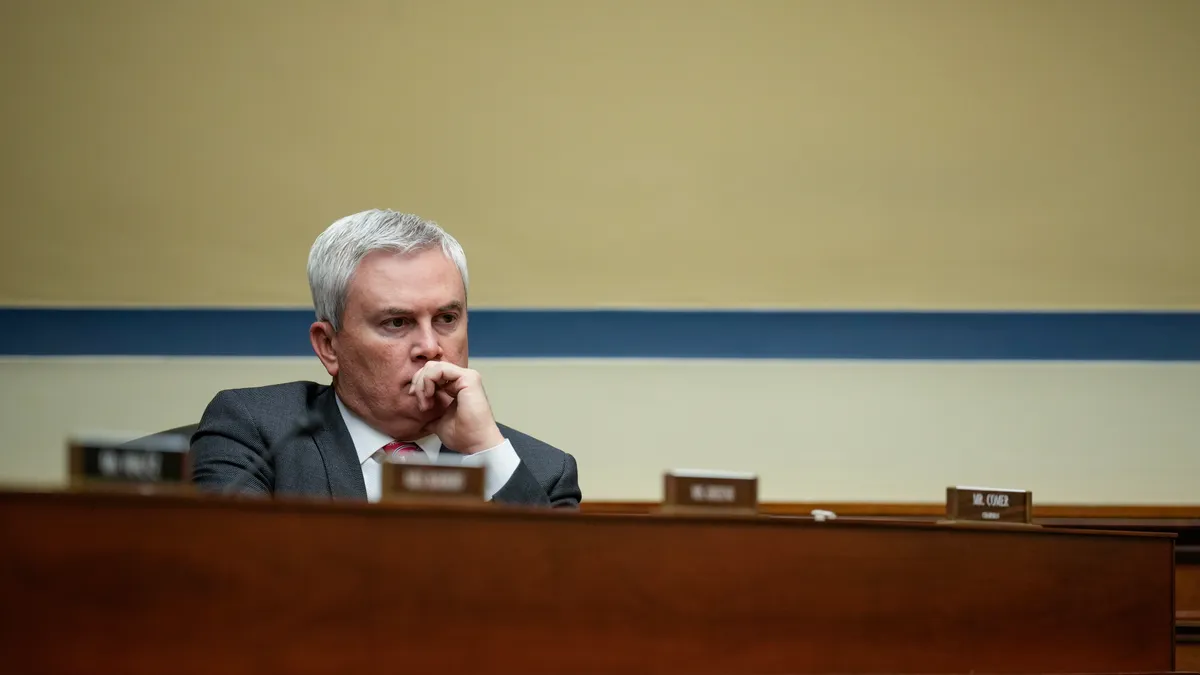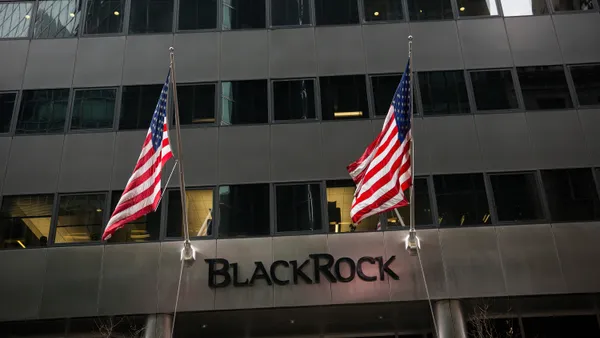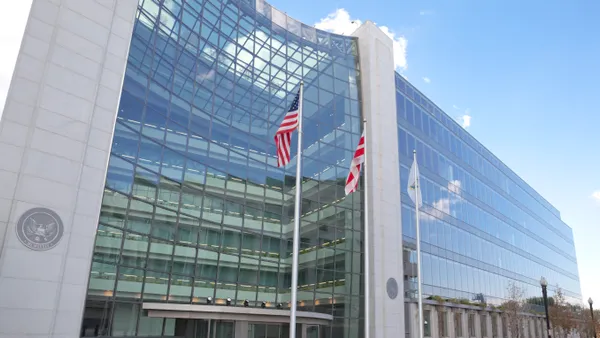Dive Brief:
- The House Oversight Committee’s majority launched a new probe into the use of environmental, social and governance factors by asset managers Monday, building on the ongoing inquiry by the House Judiciary Committee’s Republicans that has now stretched for nearly two years.
- Oversight Committee Chair James Comer sent a letter to the Federal Reserve’s general counsel Feb. 26 requesting additional information on whether pledges by ESG and climate-focused coalitions could violate the Bank Holding Company Act, Home Owners Loan Act or the Change in Bank Control Act.
- “It is critical we understand whether asset managers are abiding by the conditions the Federal Reserve has set for them and whether the Federal Reserve and other Federal banking regulators are monitoring the asset management industry’s activities,” Comer’s letter said.
Dive Insight:
Comer’s letter to Fed General Counsel Mark Van Der Weide said his committee is looking to determine whether asset managers have breached agreements with the central bank and how the industry could be subject to the BHC, HOLA and CIBC Acts through their ESG-related pledges and actions.
The Bank Holding Company Act of 1956 increased the Fed’s oversight of the banking industry and defined bank holding companies as any company with at least 25% of the shares in two or more banks, and includes outright ownership and the ability to vote on shares. The Home Owners Loan Act of 1933 has the same ownership share requirements for regulated companies. Regulated companies include bank holding companies, banks, savings and loan holding companies or savings associations, according to the bills.The Change in Bank Control Act of 1978 requires companies to notify the Fed 60 days before acquiring a regulated company.
Comer alleges that the requirements of the climate coalitions, along with their collective industry influence, could comprise ownership of regulated companies under the BHC and HOLA acts, and thus could be in violation of the CIBC.
Comer specifically mentioned the Net Zero Asset Manager Alliance, Climate Action 100+ and the United Nations-backed Principles for Responsible Investment as groups the Oversight Committee is interested in. The Kentucky Republican said the membership requirements of these groups could qualify the alliances themselves as controllers of regulated companies, according to definitions laid out in the 2019 and 2020 Fed letters.
“Pledges to act in concert with other signatories, actively pursue outcomes and use all assets under management to achieve the stated goals of the various agreements, appear to directly violate the terms laid out in [those] letters,” Comer wrote.
A Climate Action 100+ spokesperson said the actions by coalitions such as its own and NZAM are “consistent with legal obligation and comply with U.S. antitrust, fiduciary duty and securities laws,” in an emailed statement to ESG Dive. They said such investor collaboration and engagement “is not only permitted by law,” but “one of the most effective means for investors to manage climate risk and enhance long-term shareholder value.”
“Investors engage with companies and evaluate risks associated with climate change as part of a responsible investment approach to protect and enhance value, thereby fulfilling their fiduciary duties,” the spokesperson said.
In November 2019 and December 2020, Van Der Weide wrote to Vanguard and BlackRock, respectively, advising the asset managers that they and their subsidiaries can acquire up to 25% of a regulated company without “being deemed to have acquired control” under the BHC or HOLA Acts. The same letters said the companies could acquire up to 15% of a bank holding company, savings and loan holding company or state member bank without having to file notice under the CIBC Act.
Comer requested a response to the 12 questions mentioned in his letter — all seeking to determine whether utilizing ESG criteria in investment decisions is in violation of federal statute — by March 11. The letter also asks if the Fed has processes relating to monitoring the actions of these climate pledges, as well as if “implementing stewardship and engagement strategies with a clear escalation and voting policy” as NZAM’s signatories agree to, would violate the BHC, HOLA or CIBC Acts.
Climate Action 100+, some of its members and members of NZAM and PRI have also been subjects of the House Judiciary Committee’s probe on whether such climate alliances could constitute antitrust violations in the past two years.
Climate Alliance 100+ recently saw JPMorgan Asset Management and State Street Global Advisors exit the group, with BlackRock transferring its group participation to an international arm of its business.
Climate Alliance 100+ responded to the membership changes Monday, and said in a statement that while it was “disappointed to see them go, hundreds of investor signatories remain committed to ensuring 170 of the largest greenhouse gas emitters reduce emissions, improve governance, and strengthen climate-related financial disclosures.”
The Net Zero Asset Manager Alliance and Principles for Responsible Investment did not respond to requests for comment as of press time.












